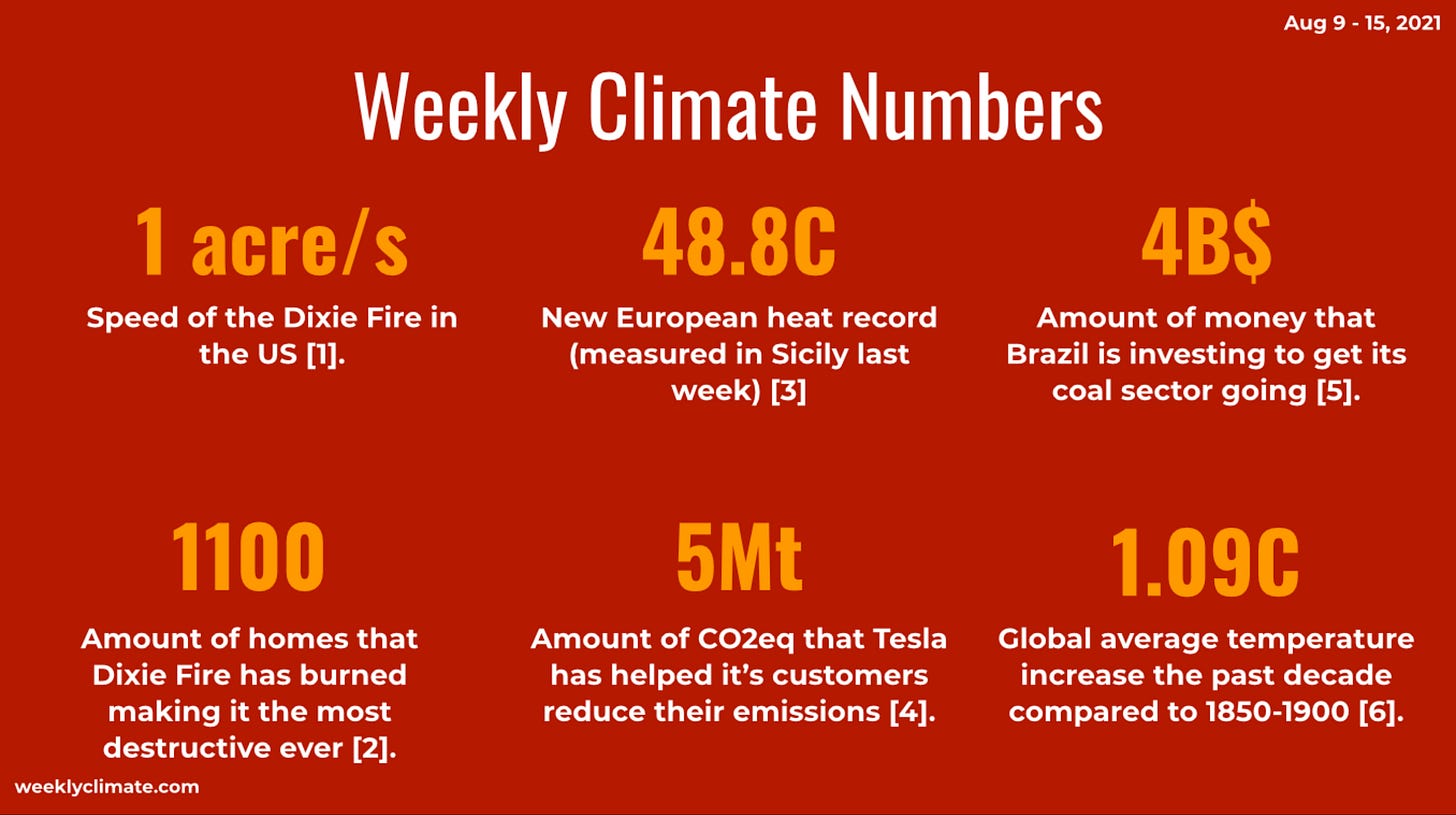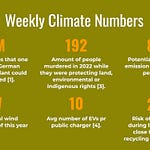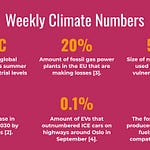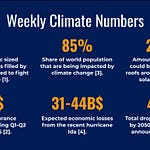Welcome to this week’s edition of The Weekly Climate 🎉
References: [1], [2], [3], [4], [5] and [6].
Happy anniversary to The Weekly Climate!
Can you believe it? It’s been one full year of non-stop gathering the most important climate crisis news for you all. Thank you to each and everyone of my dear 696 readers for reading the newsletter every week (or almost exactly every other week according to my stats).
Here are the top 3 most read issues that you may have missed:
In general it looks like my deep dives are getting a lot of reads, which I’m grateful for. The problem as you may have noticed is that I haven’t had the time to do as many as I was hoping for, which brings me to a small announcement.
You can now pay me if you want to
I’ve been doing this for a year. The newsletter is growing steadily. It’s time to go paid to ensure that I can keep it going for the next years. It is quite time consuming to write this newsletter. I spend maybe 2-3 full work-days spread out over most evenings of the week to prepare, write and record it. I need to either expand or go home. But before I ask you to pay me I want to let you in on a few plans that are cooking and that I hope can come to fruition depending on how well received this will be of course:
State-of-the-Climate 2021: Together with my researcher Knut we’ve been working on a presentation that sums up what has happened in climate for 2021. We have a database, a report format and are busily updating it. So be on the look out for this in early 2022.
Local edition: As I’ve highlighted a couple of times. I’m only able to post english-speaking news (since that’s the language I understand). This means that whatever news I post from non-english speaking countries will have to be so newsworthy that they are posted in global media outlets. This is not good enough. So I’m working on a concept to do a local version of the Weekly Climate. But for this I need more support (and to begin with volunteers in non-english speaking countries).
Podcast: I feel like the podcast as it is right now could do more. Still I don’t have the time for it. Would love to be able to expand it.
These are of course not set in stone and I can’t guarantee that I will do them, but these projects are what’s in the works. But it’s also clear that I can’t do any of them without being able to get more people onboard. So that’s one of the primary motivations for going paid.
What will it mean for the newsletter that it will be paid?
You may already have noticed one change. This morning you received two newsletters: “The Brief” and one titled as I regularly title them (in the following referred to as “The Long One”)
The Brief contains only this intro section, “News you can’t miss” and a couple of important sections from the rest of the newsletter. It won’t be narrated but it will always be free.
The Long One is the one you’ve been receiving for free this whole time. It will be narrated as always. But will be for paid members only.
Paid subscribers will also receive any deep dives that I manage to do. Paid subscribers will get both The Brief and The Long One.
All already published newsletters will remain free.
As for the price. If you don’t get 1.25$ worth of something from each newsletter, whether I’ve saved you time or you learned something, then I don’t think this newsletter is doing what it should do. Therefore, the starting price for paid members is 5$/month. You can choose to pay me more and if you do you will be mentioned on my about page along with a little sentence or link of your choosing (with my full right to change it if it’s abusive etc). More info on both memberships on the subscription page. Right now if you subscribe within the next two weeks you get a 20% discount.
If you have any questions regarding this don’t hesitate to ask (michael@weeklyclimate.com). Now all that’s left to ask is please consider to upgrade your subscription to paid if you enjoy this newsletter. To do that please click on the menu in the top right -> My Account -> And then there should be a big button up top that says “upgrade to paid”.
Thanks again for reading and on to the IPCC fueled newsletter for this week!
‼️News you can’t miss
Here’s one important scary/bad (🙀), good (😻), interesting (😼) and fossil (💩) news item.
🙀 The new IPCC report is “code red for humanity”
😻 Prescribed burns played an important role in containing the Bootleg fire.
😼 Humus (no not a typo, I’m not talking about hummus here) may not be as long lasting as we thought. If you don’t know why you should care, read this.
💩 Half-assed oil-spill clean-up in Trinidad must not go unpunished.
👩⚕️ Status: Climate & Science
Let’s look at how we’re doing this week!
[#EU] — Highest temperature recorded in Europe ever was logged in Sicily last week. A sweltering 48.8C. The previous record was 48C, which was set in Athens in 1977. It is still pending acceptance by the World Meteological Organisation.
[#heatmaps] — If you’re still confused about how a seemingly tiny change in temperature (of 1.2C) can cause such extreme weather events take a look at this map of the world, which maps which areas are heating up more. 1.2C maybe the global average, but +6C is what’s going on up North.
[#smoke] — Here’s another record that we shouldn’t be particular proud of. Smoke from SIberian wildfires have reached the north pole for the first time in recorded history. There are 3.000 km from the fires to the north pole. And the fires are getting worse.
[#ipcc] — ‘Code Red for humanity’. Those were the words of Antonio Gutierrez when he presented the new IPCC report last week. The rest of the climate science section will therefore be dedicated to that report, in fact the main part of the newsletter this week is dedicated to that report. There are a few other noteworthy news items, but this is really the most important one.
This is the final final final warming (yes we’ve had some over the years) and thus the report remains hopeful that if we act now we can still have some positive impact on the climate. There’s no room for excuses, to quote Gutierrez. The different between this and the 5th Assessment report is that the Science has gotten a lot clearer on many things especially around the attribution aspect.
As for the contents, the report cements with absolutely certainty that yes global warming exists and yes it’s us. This means that anybody, ANYBODY, telling you otherwise is misguided. And it’s your job to ignore them or help them. Here’s a few key climate stats from the report:
Global temperatures between 2011 and 2020 averaged 1.09C higher than 1850-1900.
The past 5 years has been the hottest since 1850.
Rate of sea-level rise has tripled compared to 1901-1970
Expected sea level rise 2m (2100) and 5m (2150) cannot be ruled out.
The report also states that we have already made changes to many ecosystems that can only be reversed on a decade or century scale. The oceans will continue to rise and glaciers will continue to melt for decades or centuries to come. There’s no stopping that now. We can only stop how chaotic it will get.
So what can we do? ”This report must sound a death knell for coal and fossil fuels, before they destroy our planet” quoting Gutierrez again. We’re emitting ~40Gt of CO2 every year and we have 500Gt to go to have a 50/50 chance of staying below 1.5C (remember we’re at 1.1C now). There’s no longer any excuse for any politician anywhere to continue to drill fossil fuels out of the ground. It has to stop and it has to stop now.
Other take-aways from the report includes:
We need more “adaptech” to help the world adapt as extreme weather events become increasingly chaotic.
Food security around the world will suffer no matter what we do, with impacts already expected in the next couple of decades.
Methane emissions are just as important as carbon dioxide and needs just as much attention as carbon dioxide emissions.
The report should be a rallying cry to lawyers around the world as the new report puts forth the standards with about things like attribution science, which is needed in order to blame specific events on big carbon emitters.
If you want to dive into the very deep details of what the report is saying on extreme weather events I can recommend this Carbon Brief article.
This Grist article looks at the commentary from a wide variety of climate scientists.
A very interesting look at the differences between the “Summary for policy makers” part of the report for the past years. And related, Heated reports that once again it’s very odd that the summary for policymakers (which let’s face it, is the one that most people read if anything) doesn’t contain a single word on fossil fuels. Parts of the report did, but it’s not very damning as it should be.
Ok that’s it for the IPCC report. You may find references to it sprinkled through out the rest of then newsletter, but this is my main discussion of it.
📰 The 7 Grand Challenges
⚡️Decarbonize Electricity
Clean electricity is the one do-or-die challenge we must solve.
[#renewables] — According to a new report the electricity mix in the US will rise to 23% renewables (solar, wind, hydro). Nuclear and coal is dropping and the renewables are only second to fossil gas.
[#energystorage] — Here’s a detailed look at the hottest battery techcnology startups around currently. A week or so ago we heard Form Energy’s “rust” based battery, but this article also looks at other startups in the space and which technologies they’re looking into.
🏘 Reduce impact of urban and rural areas
Lowering the impact of urban and rural areas.
[#heatpumps] — Not only are heat pumps one of many climate solutions (provided they replace a gas burner or similar fossil fuel equipment) but they will also enable households to adapt better to the coming many years of extreme heatwaves. The Rocky Mountain Institute has looked at how heat pumps can help manage the cold as well as heat inside a home.
🛁 Clean non-electrifiable activities
Some activities we do today can’t be electrified, these must be cleaned some other way.
[#steel] — The world’s largest steelmaker, China Baowu Steel Group is trialling a new steelmaking technology that could reduce carbon emissions from steel production by 30%. It has been testing the technology since June. According to company officials the company is using hydrogen and recycled gas to reduce it’s carbon emissions by 10% in 10 days.
🌳 Protect and grow nature
Nature is our ally, we must protect it and help it help us.
[#rewild] — We must rewild an area the size of China before 2030 to avoid the collapse of our life support systems. Yet that might be a challenge, because in many places (certainly in the UK which is the vantage point of this article) land is owned by the few. In the UK for instance, 50% of all land is owned by just 1% of the population. How can we make many landowners do as the “death metal baron” from last week’s newsletter does?
[#hermitcrabs] — You may have seen a couple of click-baity headlines this week with the headline something along the lines of “hermit crabs sexually attracted to plastic”. I even added it to the very early version of this newsletter, but fortunately, somebody (here Gizmodo) actually took the time to read the paper sighted and it tells a different story. No hermit crabs doesn’t get a boner when smelling / seeing plastic, but rather they’re attracted to it because (as one potential but still unconfirmed theory goes) it smells like their food. Which is a rather sad story instead.
🍽 Optimize food
Without the lower impact of food or drink the hero doesn’t work (modified old danish proverb).
[#regenerative] — Regenerative farming are picking up in the UK and that’s probably a good thing. Many farmers who do that are seeing higher margins because these practices doesn’t require as many inputs (pesticides, fuel etc). So not only does the farm itself produce fewer greenhouse gases but it also helps sequester more.
[#climate] — Here’s a look at two vineyards in the US. One that uses dry-farming (which means no irrigation) and one that doesn’t. One of them is doing better than the other and it might not be the one you think.
⬇️ Engineered drawdown and geoengineering
Protecting our planet and species one way or another
[#humus] — This is a very interesting article that I don’t really know what to think about after reading it a couple of times. Basically, it highlights what appears to be a large group of researchers who believed they have debunked the myth of so-called long-lasting “humus” which is long-lasting carbon molecules embedded in the soil that are produced by plants. Although the existence of humus is unquestionable, the long lasting properties of it is. As the researchers have proved that these molecules are eaten by microbes in the soil. The problems is that not only are universities around the world still teaching about long-lasting humus but reports such as the IPCCs latest relies on it. That the soil does sequester carbon for a long time however, is not questioned by the researchers, we know it is. But we don’t understand how.
📦 Other / catch-all
All the other stuff that I couldn’t fit into any of the other categories, than the other category.
[#venturecapital] — The global climatetech ecosystem is seeing an influx as capital as never before. VC veteran Chris Sacca announced 800M$ spread out in four funds under his Lowercarbon Capital.
[#thehumanrace] — Just a brief reminder that the #thehumanrace is starting today. If you do any kind of exercise for 100mins during the next 2 weeks and you record it using the Strava app you can help put pressure on politicians to stop kicking the can down the road when it comes to climate action especially regarding the 100B$ promised to the global south. I signed up and will run my first run under that banner today.
⭐️Special Topics
🎩 Global and local policy
We have a special interest in covering the major global and local policies regarding climate, whether good or bad.
[#brazil] — Brazil’s government announced last week that despite calls for clean electricity it wants to ramp up coal production by investing 4B$ in expanding mining operations in the country.
[#california] — What may sound really boring but is actually a really important step, California just signed it’s first green building energy code that heavily encourages electrified buildings. It is hoped that building codes such as this will help get rid of old gas burners and replace them with electric heat pumps. The standard also updates provisions around solar power.
[#ukraine] — One of the poorest countries in Europe, Ukraine, has submitted it’s updated NDCs with an increase in ambition. The country aims do so while it is fighting poverty and a war with Russia. I can think of countries with lesser problems that are not upping their ambitions enough.
[#kickthecan] — This article looks at the trend that politicians especially from G20 countries are exhibiting: Kicking the can down the road when it comes to fulfilling the pledge to be providing 100B$ in climate adaptation and mitigation support to the Global South.
🛡 Adaptation
Adapting our civilization to the coming climate crisis is vital. Here we cover various ways that is happening (or isn’t).
[#wildfireUS] — The Dixie Fire burned through 550 more homes last week, thus it just became the most destructive wildfire in California’s history. It has burned more than 2000 km2 and more than 1100 homes. And it’s not even close to being contained, currently around 30% contained and on some days it’s tearing through 1 acre (0.4hectares) every second.
[#fightfirewithfire] — As the big Bootleg fire was thundering towards the Sycan Marsh Preserve in Oregon something amazing happened. The fire slowed down, which allowed the fire fighters to gain control of it. A similar thing happened in the Black Hills Ecosystem Restoration project. What does these two areas have in common? Both areas are being managed following traditional and tribal forest management principles, in which small prescribed burns are being done to remove fuel from the vegetation.
[#wildfireEU] — The wildfires that have ravaged Greece these past weeks are more under control than they used to. A thunderstorm helped douse some of them while sparking a few others. But the fires are wake-up call for Greece which needs to change a lot of things to help cope with future events.
[#wildfireRUS] — Wildfires in Siberia are so bad that 11 municipalities around Yakutsk in Siberia has been given a non-working day on Friday Aug 13, where the leader of the region has urged people to stay indoor for health reasons.
[#wildfireAfrica] — And wildfires are burning on and on. This time in Algeria, where at least 40 people were confirmed dead in the blazes. Fires are currently burning east of the Algerian capital in the Kabyle region.
[#infrastructure] — Portland sees on average 1 day at 38C. This year it has seen 6. Seattle has seen 3 days of 38C+. Which is as many as it has seen the entire century before. So yes it’s getting hotter. But the problem is that these cities’ infrastructure aren’t built for these temperatures. For instance in Seattle, maintenance workers had to spray water on a metal bridge in Seattle to prevent the metal from expanding too much. Sounds like an expensive tax bill coming up to adapt to this. But just as infrastructure is under pressure from climate change it can help be a solution too, as this article argues. The latest IPCC reports describe how urban geometry helps keep temperatures high in cities. Especially tall buildings create so called “urban canyons” which can get very hot. So although they might be good for housing, they’re not good to help us manage the climate crisis.
⛽️ Major Carbon Emitters
We have a special interest in covering the moving of the major carbon emitters as these are the key roadblock to climate action.
[#oilspill] — An oil spill in Trinidad are raising eyebrows. Not only because this obviously harms environment and foodchain there, but certainly also because of the half-hearted clean up that the company behind is doing. It’s claiming that it’s using booms and other equipment to collect the oil when a group of fishers filmed them using another strategy. Running a speedboat through it such as to get the oil to sink, and “disappear”. Except it won’t disappear. It will just enter the foodchain and thus people living in that area.
[#oilspill] — An oil spill that happened 50 years ago in Nigeria was finally settled. The spill came from a ruptured Shell pipeline which, according to Shell, was caused by oil thieves. The spill happened in 1970s in the middle of Nigeria’s civil war. Still the spill was caused by a ruptured oil pipeline so Shell has been sentenced to pay 111M$ in damages.
[#endfossil] — When I’m the most angry and frustrated about the climate crisis such as when reading the new IPCC report an article like this feels like some sort of revenge fantasy. Yes let’s destroy those bastard fossil fuel companies who knew all along yet still continued their planet destroying activities. This article dives deep into that fantasy. As the article outlines it will be very tough. An still others (not in this article) question whether that is even the right thing to do. After all the one thing the fossil fuel industry know how to do is building infrastructure. And oh boy do we need infrastructure.
That’s it for this week folks!
This is a big day for me! I’m going paid! Thus it really puts the newsletter to the test. Does it provide you with 1.25$ worth of value every week? I believe it does. In fact I really hope that just the time alone I save you should easily cover those 1.25$. Remember that you can save 20% the first year by upgrading to paid today. Also ping me on michael@weeklyclimate.com or comment below with any feedback or comments regarding this.
Remember if you’re feeling down, angry or sad from some of the news in this newsletter one cure is to act. And one way you can always act that also happens to be one of the most powerful things you can do is to talk about it. That also works if what you just read made you hopeful or happy btw.
If you enjoyed this newsletter don’t forget to share it with your friends, coworkers or other people you think could benefit from getting it. If you got directed here by a friend or another link on the Internet don’t forget to subscribe!
See you all next week 👋












